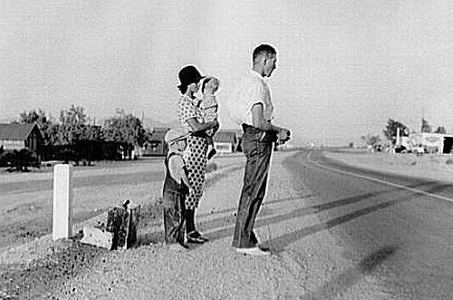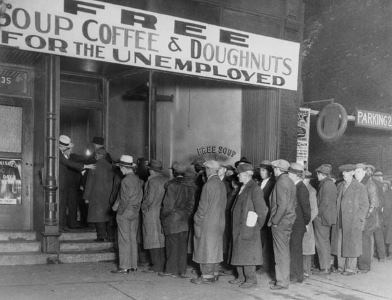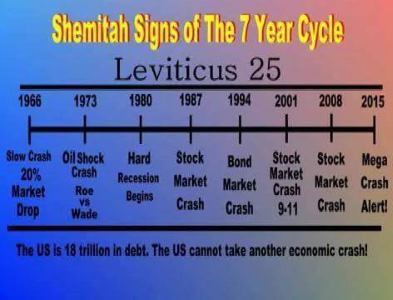Things You Must Do Before Economic Collapse Coming – September 2015
Folks, it is hard out there. But it isn’t the end of the world. The more knowledge we have, the better we can preserve our wealth and have a more satisfied life.
What I am about to share is information I have learned from our great grandparents who lived through the great depression as well as other times of hardship.
King Solomon, the wisest man in the world stated the following…
Ecclesiastes 1:9-11 The thing that hath been, it is that which shall be; and that which is done is that which shall be done: and there is no new thing under the sun.
10 Is there any thing whereof it may be said, See, this is new? it hath been already of old time, which was before us.
11 There is no remembrance of former things; neither shall there be any remembrance of things that are to come with those that shall come after.
What he is saying here is that if we do not learn from our history, we are destined to repeat it. He also states that man does not remember his history. So it is important that we do our research and make a point to try to learn from our past.
There are many great lessons that we can learn from those who lived before us. Our great grandparents were people who were not born in the age of instant gratification, Walmart or Target.
If you were hungry, you had to raise the food or go hunt or fish for food. If you did not have food, you had a skill that you could trade for food.
During the spring and summer everyone grew a garden, and when crops were being harvested, the family worked to can, dry, and lay up the excess food for the winter when there was no garden to pick from.
They tried to lay up enough food that if there was a drought or famine, there would be enough food to get them through to the next harvest.
They did not put all their money in the bank and quiet often kept much of their money underneath their mattress or some other sort of safe spot they could stash their money.
There was no such thing as 401K, IRA or some other form of retirement income. Retirement is something of a new idea and believe it or not, is not biblically supported. So they got up with the sun, did a hard day’s work, and in the evenings enjoyed the quality time with the family.
There are a lot of ideas that seem old fashioned, but you know what? Our forefathers made it through the times of economic hardship.
11 Facts About the Great Depression from Backwoods Home Magazine
1. The Great Depression did not happen overnight.
2. The media created panic and chaos with their sensationalized reports, creating uncertainty in the market.
3. Being poor was so common that being poor was considered “normal”.
4. Hard work and an enterprising attitude made a bad situation tolerable.
5. Investing time and energy in gardening and the raising of livestock (chickens and cows) had a huge payback in self-reliance.
6. Canning and preserving food was important if you wanted food to eat year-round.
7. The price of everything escalated on an almost daily basis.
8. Lawlessness was rampant. In addition to ruthless outlaws, neighbors stole from neighbors everything from food items to livestock to valuables such as jewelry and tools.
9. In spite of everything, “Robin Hoods” emerged from unexpected places to help feed the people.
10. Families learned to make do and to enjoy themselves with amusements and hobbies that took little or no money.
11. And perhaps the biggest lesson, use it up, wear it out, make do, or do without!
It was all over the news, January 5th 2015, the price of oil fell below $50 for the first time since April 2009, and the Dow dropped 331 points.
At the same time the Russian economy has been tanking and the ruble losing ground. As a result, Russia has fallen into an economic collapse.
January 15th 2015 the Swiss make a move that rocks the world’s markets. They depeg from the Euro. Instantly the Swiss franc goes up in value by 30% and the Euro starts dropping through the floor.
As a result the stock market in Europe drops and the euro sank to a fresh nine year low.
Further south in Greece the anti-austerity (Marxist) Syriza party in Greece was victorious which brings global concerns that Greece might just thumb their nose at the EU and default on their debt. The Grecians have been suffering already and they figure that how much worse could it get if they just bailed and flew solo again.
If you have been a reader of mine, you know that I have been pointing to an economic collapse, probably starting in third quarter 2015.
Why third quarter?
US History shows that when the US suffers and economic meltdown of some sorts, it always seems to take place in September – October
Just look at history.
Black Monday – October 28, 1929 – the stock market starts to destabilize and crashes thus beginning the Great Depression.
Black Monday – October 19, 1987 — stock markets around the world crashed, shedding a huge value in a very short time. The crash began in Hong Kong and spread west to Europe, hitting the United States after other markets had already declined by a significant margin. The Dow Jones Industrial Average (DJIA) dropped by 508 points to 1738.74 (1)
Black Friday – October 13, 1989
October 27, 1997 Mini Crash
September 11, 2001 – The economic effects arising from the September 11 attacks were initial shock causing global stock markets to drop sharply. The September 11 attacks themselves resulted in approximately $40 billion in insurance losses, making it one of the largest insured events ever. (2)
I strongly believe that 2015 will be a year that begins / creates financial crashes, economic chaos and possibly the start of the next great worldwide depression.
Why?
Simple demographics and trends clearly show that global movement of money is starting to slow down.
Looking at Our Past
How did people survive the Great Depression of 1929?
Many families survived, but they survived because they took the steps necessary to protect their family’s health and welfare.
It did not take the smarts of a rocket scientist to realize that the nation’s economy was circling the drain. Then, like now we can clearly see our present day economy start to circle the drain as well.
Those who recognized the writing on the wall did something.
BUT… there were those who ignored the signs of a coming collapse and did nothing.
Here is one statement from one young gent…
Clifford St. Martin, who was on the bum from 1931 to 1938 told the following story. “When I woke in the morning I worried about something to eat. After breakfast I worried about where to go. In the afternoon, I’d more worry about getting food. When it started to get dark, it was time to worry about a place to sleep.”
Now on the flip side there were people who were able to help their fellow man because they were prepared. Because they acted on what they saw they were also in the position to offer some sort assistance to those who had nothing.
Here is a story of one family…
In the 1930s, Albert Tackis’s family lived in the small West Virginia town of Colliers, where their house backed onto the Burgettstown Grade. Two-engined freight trains stopped at a water tank behind the house before starting the 30-mile haul to Burgettstown. In summer, Albert would see 60 or 70 hobos climb off the cars to stretch their legs, every train delivering as many as eight hobos who came to the Tackis home to ask for food.
“We were five people in our family: mother, father, grandpap, my sister and me. Grandpap grew all our fruit and vegetables in his garden. In season, mother canned vegetables and made jellies. Every week, she baked 21 loaves of bread.
“When grandpap saw the hobos coming to our house, he alerted mother who would start making egg sandwiches and packing bags with carrots, tomatoes, apples and peaches. Grandpap always had something for the hobos to do. There would be wood to chop, cans to pick bugs and insects in his garden, buckets to fetch water from a spring. The hobos worked for about 20 minutes and then hopped back on the train with a good meal in hand.” (5)
Here is another heart felt story of compassion…
Ann Walko was deeply moved by her mother’s compassion for the downtrodden who came to their home at Wall, Pennsylvania where freight trains were broken up and re-routed.
“One day a man came to our door asking for food. Mother invited him in but he stood in silence for a moment.
“‘I have a family with me,’ he said.
“Mother said she would feed them too. He brought his wife and three children. They still refused to come inside so mother spread two rugs on the ground for them. They ate her home-made bread and baked beans and couldn’t thank us enough. In a way what a beautiful time it was.”
So let me ask you, which person would you rather be? The hobo or the families who prepared and were in the position to offer help?
Learning From Our Past
Just doing a quick google search here are five things that families in the past did to help them get through the great depression.
I present these not as a final solution, but something to “prime the pump” or help us get our “thinking caps on.”
- They banded together and helped each other out.
- They were flexible.They found any kind of work. They looked for multiple streams of income. They rented out rooms.
- They cut costs. They made do with what they had. They patched their clothes and repaired items.
- Cash was king. They avoided banks, and loaned to each other. They bartered services.
- They diversified their savings. They didn’t put all their money into one thing.
What do we need to do in order to prepare for the coming economic collapse?
Are there practical steps that we can take right now that will help us and our families survive the economic collapse that is approaching?
Once people become convinced that an economic collapse is coming, the next step is trying to figure out what they should do.
One of the first things that one should do is start building up their pantry. I have a whole book dedicated to this titled “Survive The Coming Storm – The Value of A Preparedness Lifestyle”
In that book I focus primarily on preparing your food, water and medical storage. In this book I give realistic solutions, not these “doomsday prepper” ideas which are not realistic for most people. I really wrote that for real people looking for real solution. I highly recommend you get that book if you do not have a food storage solution in place. Having a food storage solution in place is what got most of the families through the great depression. What we need to remember is that being prepared was a way of life then. Walmart, Target and Price Club were not around. One had to learn how to can and preserve their own food.
My book talks about truly successful ways because I and my family were the guinea pigs. If it did not realistically work for us, then it probably will not work for you.
Another point is that in my book I reviewed many products that DO work and are built to last. You need these items in hard times and you do not need for them to break because you purchased an inferior product.
One of the best ways to put money back in your pocket is to produce your own food. No matter where you live, city, suburbs or country, you can grow and raise your own food. It is how successful families during the Great Depression made it.
Here is just a small portion explaining the importance of raising your own food.

16 Nov 1930, Chicago, Illinois, USA — Notorious gangster Al Capone attempts to help unemployed men with his soup kitchen “Big Al’s Kitchen for the Needy.” The kitchen provides three meals a day consisting of soup with meat, bread, coffee, and doughnuts, feeding about 3500 people daily at a cost of $300 per day. — Image by © Bettmann/CORBIS
The Great Depression changed the lives of people who lived and farmed on the Great Plains and in turn, changed America. The government programs that helped them to live through the 1930s changed the future of agriculture forever. Weather touched every part of life in the “Dirty 30s”: dust, insects, summer heat and winter cold. York County farm families didn’t have heat, light or indoor bathrooms like people who lived in town. Many farm families raised most of their own food – eggs and chickens, milk and beef from their own cows, and vegetables from their gardens.
People who grew up during the Depression said, “No one had any money. We were all in the same boat.” Neighbors helped each other through hard times, sickness, and accidents. Farm families got together with neighbors at school programs, church dinners, or dances. Children and adults found ways to have fun for free – playing board games, listening to the radio, or going to outdoor movies in town.
When the dryness, heat, and grasshoppers destroyed the crops, farmers were left with no money to buy groceries or make farm payments. Some people lost hope and moved away. Many young men took government jobs building roads and bridges. By 1940, normal rainfall returned, and federal programs helped to boost farm prices and improve the soil. About the same time, a new government program started to hook up farmhouses to electricity, making farm life easier and safer.
Farms in the 1930s were diversified, growing a variety of crops in the fields, vegetables in the garden and fruit in the orchard. Small farms usually raised chickens, eggs, hogs, and cattle, as well as keeping horses and mules for work, and sometimes sheep for wool and meat. Some farmers kept bees and harvested the honey. Women baked their own bread.
During the Depression, this self-sufficiency carried over into their social life. One-dish suppers and church potlucks were important ways to have fun and share food. On radio and in women’s magazines, home economists taught women how to stretch their food budget with casseroles and meals like creamed chipped beef on toast or waffles. Chili, macaroni and cheese, soups, and creamed chicken on biscuits were popular meals.
I will continue this line of thought in future articles and look at realistic ideas on what we can do, prepare, preserve and preserver.
Stay tuned , keep calm and carry on(source)
How to Prepare for Economic Collapse
Lou Comunale of News2morrow explains how you can prepare for the NY Stock Exchange collapse in the Fall of 2015. Many Christian prophets have pinpointed Autumn 2015 for the crash. Economists are also predicting a crash soon, without saying it’s this fall.
Lindsey Williams – Things You Must Do Before September
Look What Will Happen After The Dollar Collapse
Other Useful Resources :
Drought USA (Discover The Amazing Device That Turns Air Into Water)
Survive The End Days (Biggest Cover Up Of Our President)
Survival MD (Best Post SHTF Medical Survival Guide Ever)
Bullet Proof Home (A Prepper’s Guide in Safeguarding a Home )
Sold Out After Crisis (Best 37 Items To Hoard For A Long Term Crisis)
Family Self Defense (Best Self Defense Strategies For You And Your Family)
Backyard Innovator (All Year Round Source Of Fresh Meat,Vegetables And Clean Drinking Water)
Blackout USA (EMP survival and preparedness)
Conquering the coming collapse (Financial advice and preparedness )
Liberty Generator (Easy DIY to build your own off-grid energy source)
Backyard Liberty (Easy and cheap DIY Aquaponic system to grow your organic and living food bank)





